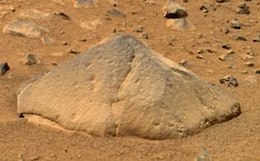Mars Exploration Rover
 |
|
| Coordinates | 14°36′S 175°30′E / 14.6°S 175.5°ECoordinates: 14°36′S 175°30′E / 14.6°S 175.5°E |
|---|---|
NASA's Mars Exploration Rover (MER) mission is an ongoing robotic space mission involving two Mars rovers, Spirit and Opportunity, exploring the planet Mars. It began in 2003 with the sending of the two rovers: MER-A Spirit and MER-B Opportunity—to explore the Martian surface and geology. Both rovers outlived their planned missions of 90 Martian solar days by far. MER-A Spirit was active until 2010. MER-B Opportunity is still active. The success of the two MERs led to another mission, sending a bigger rover Curiosity in 2012.
The mission's scientific objective was to search for and characterize a wide range of rocks and soils that hold clues to past water activity on Mars. The mission is part of NASA's Mars Exploration Program, which includes three previous successful landers: the two Viking program landers in 1976 and Mars Pathfinder probe in 1997.
The total cost of building, launching, landing and operating the rovers on the surface for the initial 90-sol primary mission was US$820 million. Since the rovers have continued to function beyond their initial 90 sol primary mission, they have each received five mission extensions. The fifth mission extension was granted in October 2007, and ran to the end of 2009. The total cost of the first four mission extensions was $104 million, and the fifth mission extension is expected to cost at least $20 million.
In July 2007, during the fourth mission extension, Martian dust storms blocked sunlight to the rovers and threatened the ability of the craft to gather energy through their solar panels, causing engineers to fear that one or both of them might be permanently disabled. However, the dust storms lifted, allowing them to resume operations.
...
Wikipedia
